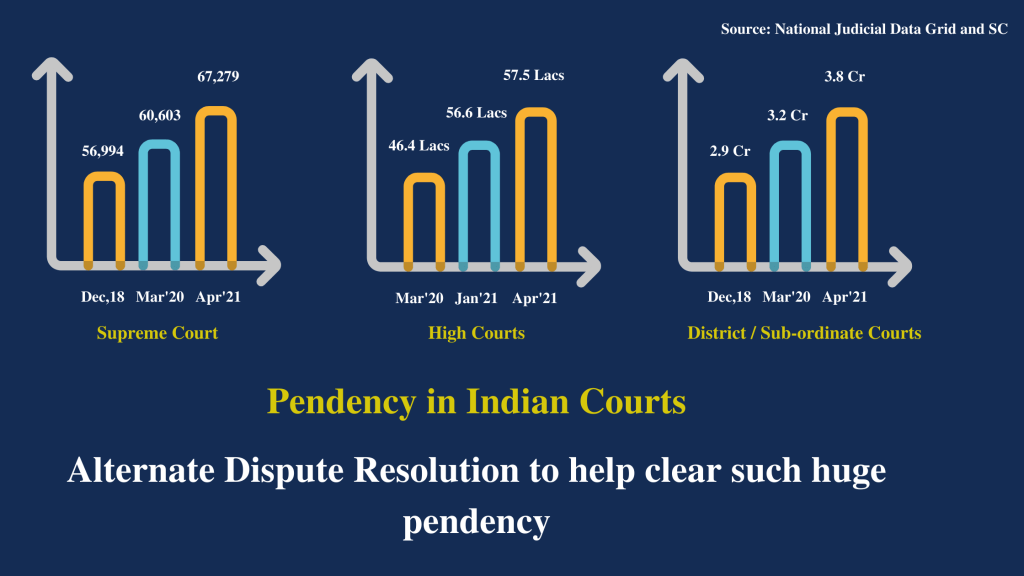Online Dispute Resolution (ODR) Is A Type Of Alternative Dispute Resolution (ADR) That Uses Internet Technology To Enable Online Dispute Resolution Via The Internet Or A Virtual Communication Platform. This Implies That The Dispute Could Be Resolved Without The Parties Being Present In The Same Location. The Goal Of ODR Is To Provide A More Practical And Cost-Effective Alternative To In-Person Meetings For The Resolution Of Legal Cases. ODR Is A Broad Field That Can Be Applied To A Variety Of Disputes, Ranging From Interpersonal Conflicts Such As Consumer-To-Consumer Disputes (C2C) Or Marital Separation To Court Disputes And Interstate Conflicts.
In A Developing Country Like India, The Use Of ODR Is Critical. However, As A Result Of The Pandemic Outbreak, ODR Is Becoming More Important. It Also Appears That Common Issues With ADRs Regarding Jurisdiction And Other Challenges Related To Geographical Limitations Are Being Addressed In Conjunction With Automated Administrative Operations To Promote Environmentally Friendly Processes And Improved Expert Productivity. Having Said That, The Various Branches Of Government Have Been Undertaking Projects To Make Our Judicial And Legal Systems More Technological In Order To Ensure Quick Implementation Even In Times Of Crisis.
Current Status of Pending Cases in Indian Courts
India’s Legal System Is Under A Lot Of Stress. The COVID-19 Pandemic’s Impact On The Courts’ Restricted Operation Has Considerably Worsened The Pervasive Issue Of Case Pendency That Has Long Plagued India’s Justice Delivery System.
Over 4.7 Crore Lawsuits Were Still Outstanding In Courts At All Levels Of The Legal System As Of May 2022. A Little More Than 1,82,000 Of Them Have Cases That Have Been Outstanding For More Than 30 Years, With 87.4% Of Them Being Pending In Lower Courts And 12.4% In High Courts. Between December 2019 And April 2022, The Number Of Cases Pending In Indian Courts Increased By More Than 27%.
The Coronavirus Outbreak Caused Additional Delays In The Indian Legal System. As Courts Turned Digital, There Was A Decrease In The Number Of New Cases Filed, But With Lockout Limits In Place, A Slower Case Disposition Rate Led To More Pending Cases.
The Core Requirements Of A Good Judicial Administration Are Accessibility, Affordability, And Prompt Justice. These Requirements Cannot Be Met Unless And Until The Justice Delivery System Is Made Accessible To Everyone In A Timely Way And At A Reasonable Cost. Therefore, Ongoing Formative Evaluation Is Essential To Improving And Bolstering India’s Justice Delivery System.
Use of Alternative Dispute Resolution Mechanisms to Reduce Court Pendency

Everyone Is Aware That The Current Legal System Is Very Costly And Time-Consuming. Since The Parties To The Issue Must Wait Years For Justice, Trust In The Legal System Has Inevitably Decreased. Alternative Remedies For The Resolution Of Conflicts Have Emerged As A Result Of The Legal System’s Shortcomings In Order To Deliver Justice More Quickly. By Utilising Information And Communication Technology, Online Conflict Resolution Uses Alternative Dispute Resolution Techniques To Resolve Disputes More Quickly And Affordably.
Read More on Alternative Dispute Resolution In India
Modes of Online Dispute Resolution (ODR) in India
Arbitration
The Arbitration And Conciliation Act Of 1996 Governs Arbitration. In Arbitration, A Third Party, Known As The “Arbitrator,” Hears The Arguments And Evidence From The Parties Before Deciding How The Dispute Will Be Resolved. The Rules Of Evidence Are Typically Laxer In Arbitration Than They Are In Courts. When A Dispute Is Resolved Through Binding Arbitration, The Parties Give Up Their Right To File A Lawsuit And Consent To Accept The Arbitrator’s Ruling As The Final Word. Normally, The Arbitrator’s Ruling Cannot Be Challenged In Court. If The Parties Do Not Agree With The Arbitrator’s Ruling, They May Go To Court. This Is Known As Non-Binding Arbitration. There Are Several Different Types Of Arbitration, Including Ad Hoc, Institutional, Statutory, And Fast Track.
Mediation
In Mediation, A Third Party Known As A “Mediator” Assists The Parties In Coming To A Mutually Agreeable Resolution. The Mediator Does Not Settle The Conflict; Rather, They Facilitate Communication Between The Parties So That They Can Attempt To Settle It On Their Own. Unlike Arbitration, Mediation Is Not Legally Binding On The Parties. The Main Benefit Of Mediation Is The Total Confidentiality Of The Entire Procedure. By Reducing The Amount Of Time, Money, And Emotional Stress Involved In Resolving A Conflict, Mediation Helps The Parties Rebuild Their Mutual Respect And Trust. It Is Possible To Maintain Feelings And Emotions Between Parties With The Least Amount Of Stress And Pain.
Conciliation
Although It Is Less Formal Than Arbitration, Conciliation Is A Type Of Arbitration. The Arbitration And Conciliation Act Of 1996 Governs Conciliation. It Is A Procedure That Encourages Amicable Resolution Between The Two Parties. In This Procedure, The Disputing Parties Designate A Conciliator To Meet With Them Separately To Settle The Conflict In Order To Lessen Hostility, Enhance Communication, And Clarify The Issue In Order To Come To A Mutually Agreeable Solution. This Is Different From Arbitration In That There Is No Requirement For An Advance Agreement And It Cannot Be Enforced On Any Party Who Declines To Seek A Settlement.
Advantages of Online Dispute Resolution (ODR)
Faster Process
ODR Enables Parties To Settle Disagreements In Faster Rather Than Through Protracted Court Sessions.
Reduced cost of litigation
The Decrease In Costs Associated With Conflict Resolution Through Litigation Procedures Is Probably The Most Frequent Justification For ODR Use.
Confidentiality
Parties Can Agree Through ODR To Keep All Proceedings And Result Private. This Enables The Parties To Concentrate On Resolving Their Differences Without Worrying About The Reaction Of The Public. Technology Is Also Useful For Securely Storing All Case-Related Documents In The Cloud.
Maintain Business Relationships
The Use Of ODR May Be Able To Preserve The Chances Of Any Ongoing Business Relationships Between The Disputing Parties, Whereas Litigation And Court Proceedings May Very Well Dismantle The Professional Relationship.
Awards as the final decision
ODR Awards Are Typically Not Appealable, Depending On The Mutually Negotiated Terms. Decisions Made In Court Can Frequently Be Challenged Through Additional Litigation.
To Strengthen The Base, ODR Requires Widespread Sensitivity And Education At The Grassroots Level Via Social Media, Education, Streets, Advertising, Seminars, And Campaigns, Among Other Things. Government Involvement Is Also Important In Financing ODR Efforts And Assisting In The Development Of The Technological And Administrative Infrastructure Required To Develop An ODR Process.
WeVaad’s Online Dispute Resolution Platform.

WeVaad Is An Online Dispute Resolution Platform That Offers Arbitration, Mediation, And Conciliation Services. We Have An Experienced Panel Of WeVaad Experts Who Act As Arbitrators/Mediators/Conciliators To Help You Resolve Disputes Faster And More Economically.
All The Processes Viz Arbitration, Mediation And Conciliation Are Governed By WeVaad Rules Which Are Structured To Make The Whole Process Simpler And Convenient For The User. Our Processes Are Designed On Our Online Platform. We Also Give You Assistance In Terms Of Providing Administrative Support Through Our Case Managers. We Promise To Resolve Legal Disputes Within 90 Days. It Is Possible Only Because Of Our Extensive Use Of Technology And Simplified Process. If You Have A Legal Dispute And Looking For Faster And More Affordable Dispute Resolution Methodologies, Then Get In Touch With Us.

